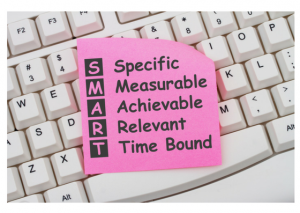Setting Goals for SEO
Before we delve into how to set your own SEO goals, let’s remind ourselves briefly what SEO is.
What is SEO?
SEO stands for search engine optimisation. Simply, SEO is just about ensuring a website can be found when a searcher uses words and phrases relevant to the sites offerings.
SEO isn’t as c omplex as it may first appear, it just involves ensuring your target market can reach your site through what they type in their search box.
omplex as it may first appear, it just involves ensuring your target market can reach your site through what they type in their search box.
Your target market, the type of people you want to visit your website, can be referred to as quality traffic.
You don’t want people to stumble across your website who are looking to buy a table when you’re a restaurant. They’re not quality traffic – because they have no interest in your services.
In a nutshell, SEO is all about the right people finding the right websites on their SERP, search engine results pages.
It’s crucial to set goals that are catered specifically to your site’s business needs.
Its fundamental brands consider their target market, available recourses, time and site behaviour. If not, you could end up with unrealistic goals that will result in an inefficient SEO process.
SMART and Setting Goals for SEO
Use SMART to set relevant, achievable targets.
Specific
Your SEO goals must be specific.
The 5 ‘W questions’ will help you to set specific goals.
What? Will help you to understand what it is about your site that you need to focus on.
- – What is a conversion on your site?
- – What do you want to achieve with setting goals for SEO?
- – What is the purpose of improving your SEO?
Who? Will help you remember who is involved and who you’re setting goals for.
- – Who is your target market?
- – Who can support your SEO process?
- – Who will help you to achieve website optimisation? Developers? Content Writers?
Where? Will help you to locate where improvements will be made.
- – Where does your business have an online presence?
- – Where will your SEO optimization be improved? At an agency? In-house? Freelancers?
Which? Will help you to identify where needs improving.
- – Which are the most important pages on your website?
- – Which are your main products or services?
- – Which pages are most popular?
- – Which pages are never reached?
Why? You need to remember exactly why you’re setting goals for SEO in the first place.
- – Why are you starting or improving your SEO process?
- – Why does your current design need to improve?
- – Why does your site have its current SEO ranking?
Think about your business and answer each the questions.
By answering the questions, you have your own specific list of requirements and an overview of your site. Perhaps create an audit so you can verify your answers.
Measurable
When setting goals for SEO, you need to be able to see whether your efforts are successful or unsuccessful.
 I’d advice measuring your efforts routinely throughout the process, so if things aren’t going according to plan you can address it quickly without wasting a lot of time.
I’d advice measuring your efforts routinely throughout the process, so if things aren’t going according to plan you can address it quickly without wasting a lot of time.
Before you even set your goals, you need to know how you will measure the effectiveness of your SEO process.
There’s a lot to consider, like what will indicate your success of failure? How and who is going to check your SEO?
What are you going to determine as success? More conversions? A high ranking? Incoming links? Organic visits?
Installing analytics is a good start, but it won’t be enough.
You need to be specific, so you can measure your goals accurately.
Here’s a few examples of SEO metrics you may want to consider –
- – Your total links built
- – SERP ranking for keywords
- – Your increase in organic traffic
- – Increases in organic conversions
- – Pages on your site that generate traffic
Achievable
Achievability is arguable the most important part of SMART and setting SEO goals.
Are your goals reasonable? Your goals are specific, you know how to measure the effectiveness, but are you going to be able to achieve them?
Without being too harsh, or too optimistic, you need to evaluate the likelihood of achieving your goals. Therefore, it’s important for your goals to be specific and measurable.
Go back. Reflect on your goals and how you will achieve them and evaluate whether you will be successful. Maybe you will need more time? Do you have the skills internally to achieve them or will an agency or freelancer be able to assist?
You need to know who your competitors are. Are you in the same league? If you’re using the same keywords as global, big corporations, is there a chance to have a ranking on page one of SERP?
Also, prioritize your goals. Identify which are most important and which you will need the most time focusing on.
Relevant
Constantly relate back to your business’s purpose.
Are your targeted keywords and targeted traffic relevant to your products or services?
Think about the keywords you’re using – will your target market think to use that keyword? Put your self in your audience’s shoes, remember it’s them who will be typing in the search box not yourself.
If your ranking has increased but your website traffic hasn’t increased like expected, perhaps you’re using the wrong keyword to target the wrong audience.
Timely
Is the clock on your side, or not? Dependent on your goals, optimising your website could take a long time.
It’s not easy to predict how long optimising your website will take or cost, so it’s important to have extra time and money in case the process is taking longer than expected.
I suggest creating an estimated time-line, with space for amendments if needed.
If you’re an agency improving SEO for a client, make sure they’re aware your time-line is an estimation and not definite.
Summarising SMART and Setting Goals for SEO
It’s often unrealistic to want to rank #1 for a keyword. Whilst it may be achievable for some businesses, particularly if there isn’t a lot of competition, for most it’s not a SMART goal.
It’s never to late to start focusing on SMART goals. Different Gravy Digital Marketing offer a full SEO service including; coding in line with latest algorithms & best practice, quality & relevant content, link building, keyword research, paid advertising and re-targeting
Contact us today!
0161 706 0004
mg@differentgravydigital.co.uk
About the author:
Marie Harwood is a Digital Marketing Assistant at Different Gravy Digital, Hale, Cheshire.
Different Gravy Digital are a full service Digital Marketing Agency operating in the Hospitality & Leisure, Financial Services, Legal & Property sectors. Products and services range from; 3D & 360° Tours, Website Design & Build, Social Media, Video Production, Search Engine Optimisation (SEO), Content Creation, Email Marketing, Online Feedback / Review Systems and Paid Advertising (Google, Bing and Social Media).
Contact Details:
marie@differentgravydigital.co.uk
0161 706 0004
120a Ashley Road, Hale, Altrincham, Cheshire, WA14 2UN
